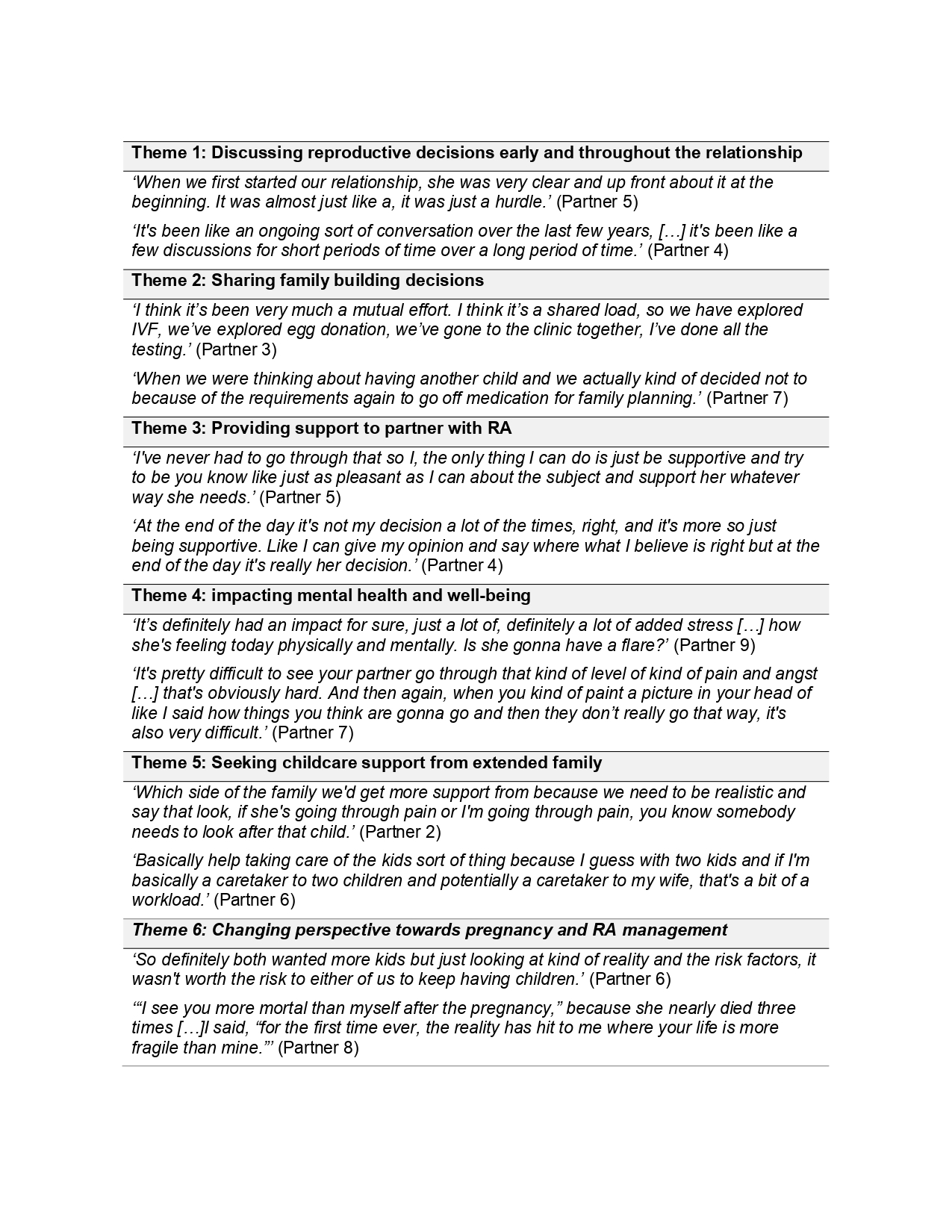Session Information
Session Type: Poster Session D
Session Time: 9:00AM-11:00AM
Background/Purpose: Partners of women with rheumatoid arthritis (RA) often take on caregiving roles given the debilitating nature of RA. No research to date has explored partners’ roles with respect to reproductive decision-making. Our objective was to explore the perspectives, attitudes, and experiences of partners of women with RA regarding reproductive decisions around family building.
Methods: Study Design: We conducted a qualitative research study involving semi-structured interviews. Participants: Individuals were eligible if they were 18 years or older, had a partner with RA who participated in our related study on how women with RA make family-building decisions, and were able to communicate in English. We define ‘partners’ as individuals within an intimate relationship. Data gathering: We conducted semi-structured telephone and video conference interviews lasting 30 to 60 minutes. Each interview followed an intensive approach characterized by use of open-ended questions. Analysis: We applied a constructivist grounded theory approach, which involved initial line-by-line coding, a strategy which promotes conceptualization of emerging themes. Afterwards we conducted focused coding which led to development of themes as indicated by theoretical saturation.
Results: We interviewed 9 partners of women with RA. All participants identified as male with a median age of 34 years. Overall, 44% had at least one child with a woman with RA while the rest had not had children with a women with RA. Additionally, 77% were considering conceiving children with their significant other with RA. Emerging themes from our analysis indicate that couples discuss reproductive options early and throughout their relationship and share the decisions for building a family. In an effort to aid their significant other, partners also discussed methods of providing support. Partners described impacts on their mental health and well-being related to additional stressors of supporting their significant other and making reproductive decisions, as well as expressing a desire for childcare support from extended family. After having children with women with RA, partners indicated a change in perspective towards pregnancy and RA management, often resulting in the decision to have fewer children. Table 1 shows themes and representative quotes.
Conclusion: Our findings demonstrate the far-reaching impacts of RA and reproductive decision-making on the partners of women with RA. Participants expressed taking part in shared decision-making with their partner, concern for their significant others’ physical health during pregnancy, and described impacts on their own mental health. Overall, our findings highlight the need for comprehensive supports for both women with RA and their partners throughout family building and pregnancy. Healthcare providers can identify opportunities for intervention or care adaptation that involves women with RA and their partners minimizing stress and the negative impacts on the family.
 Themes and representative quotes
Themes and representative quotes
To cite this abstract in AMA style:
Garg R, Rebic N, Amiri N, Hazlewood G, Baldwin C, Ensworth S, Proulx L, De Vera M. Roles and Perspectives of Partners of Women with Rheumatoid Arthritis on Reproductive Decision Making: A Constructivist Grounded Theory Study [abstract]. Arthritis Rheumatol. 2020; 72 (suppl 10). https://acrabstracts.org/abstract/roles-and-perspectives-of-partners-of-women-with-rheumatoid-arthritis-on-reproductive-decision-making-a-constructivist-grounded-theory-study/. Accessed .« Back to ACR Convergence 2020
ACR Meeting Abstracts - https://acrabstracts.org/abstract/roles-and-perspectives-of-partners-of-women-with-rheumatoid-arthritis-on-reproductive-decision-making-a-constructivist-grounded-theory-study/
